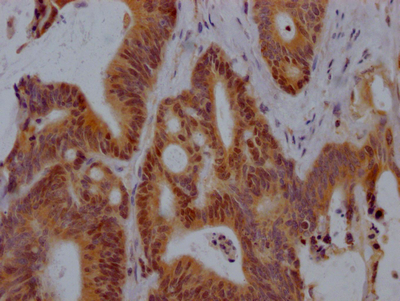CCHa2 Antibody
产品详情
-
Uniprot No.:Q8SXL2
-
基因名:CCHa2
-
别名:Neuropeptide CCHamide-2 CCHa2 CG14375
-
反应种属:Drosophila melanogaster (Fruit fly)
-
免疫原:Synthetic Peptide (27-39aa)
-
免疫原种属:Drosophila melanogaster (Fruit fly)
-
标记方式:Non-conjugated
-
克隆类型:Polyclonal
-
抗体亚型:IgG
-
纯化方式:Affinity-chromatography
-
浓度:It differs from different batches. Please contact us to confirm it.
-
保存缓冲液:Preservative: 0.03% Proclin 300
Constituents: 50% Glycerol, 0.01M PBS, pH 7.4 -
产品提供形式:Liquid
-
应用范围:ELISA
-
Protocols:
-
储存条件:Upon receipt, store at -20°C or -80°C. Avoid repeated freeze.
-
货期:Basically, we can dispatch the products out in 1-3 working days after receiving your orders. Delivery time maybe differs from different purchasing way or location, please kindly consult your local distributors for specific delivery time.
靶点详情
-
功能:Ligand for the CCHamide-2 receptor CCHa2-R. In one study, shown to be an orexigenic peptide which induces appetite and stimulates food intake, leading to the release of insulin-like peptides which stimulate growth. In another study, shown to be a nutrient-sensitive peptide derived from peripheral tissues which controls growth by directly regulating the production and release of insulin-like peptides.
-
基因功能参考文献:
- conclude that CCHamide-2 is an orexigenic peptide and an important factor for controlling developmental timing in Drosophila PMID: 26168160
- orcokinin B, CCHamide 1, and CCHamide 2 expression in Drosophila is reported. PMID: 24850274
-
亚细胞定位:Secreted.
-
组织特异性:Expressed in endocrine cells of the larval midgut (at protein level). Also expressed in endocrine cells of the midgut of adult males and females (at protein level). In the midgut, expression occurs mainly in the anterior region (at protein level). In the
-
数据库链接:
KEGG: dme:Dmel_CG14375
STRING: 7227.FBpp0082230
UniGene: Dm.20712
Most popular with customers
-
YWHAB Recombinant Monoclonal Antibody
Applications: ELISA, WB, IF, FC
Species Reactivity: Human, Mouse, Rat
-
Phospho-YAP1 (S127) Recombinant Monoclonal Antibody
Applications: ELISA, WB, IHC
Species Reactivity: Human
-
-
-
-
-
-





















